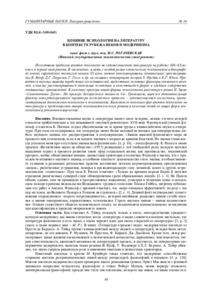Please use this identifier to cite or link to this item:
https://elib.psu.by/handle/123456789/14053| Title: | Влияние психологии на литературу в контексте рубежа веков и модернизма |
| Authors: | Рогачевская, М. С. |
| Issue Date: | 2015 |
| Publisher: | Полоцкий государственный университет |
| Citation: | Вестник Полоцкого государственного университета. Серия A, Гуманитарные науки. - 2015. - № 10. – C. 59-64. |
| Abstract: | Исследована проблема влияния психологии на художественную литературу на рубеже XIX–XX веков и в период модернизма. В частности, в связи с особой ролью клинического психоанализа в биографи- ях многих европейских писателей начала ХХ века, можно констатировать сознательное ориентирование В. Вулф, Д.Г. Лоуренса, Г. Гессе и др. на ставшие популярными теории З. Фрейда и К.Г. Юнга. Приводятся научные выводы зарубежных исследователей, выделяющих основные факторы указанного влияния, а также рассматриваются отдельные тенденции в изменяющейся форме и идейном содержании создаваемых произведений. В качестве примера новой формы психологизма рассмотрен роман И. Звево «Самопознание Дзено». На примере белорусского писателя Ст. Гринкевича, выделен дополнительный фактор интердискурсивного характера исследуемого процесса – художественная эссеистика, пропагандирующая достижения психологии и психоанализа. Выделяется несколько фаз влияния психологии на литературу и представлении жанра психоаналитического романа в качестве одной из новых форм психологизма в романном творчестве.= The article examines the influence of psychology on fiction at the turn of the 20th century and during the modernist period. In particular, due to a specific role of the clinical psychoanalysis in many European writers’ biographies at the beginning of the 20th century, and taking into account the fact of their combing the literary and scientific activities, we can state their conscious orientation (V. Woolf, D.H. Lawrence, M. Proust, etc.) towards Freud’s and Jung’s theories which became very popular. In the article we also refer to the results of other scholars’ research who analyze the main factors of the influence mentioned. Besides, some tendencies in the changing form and content of the novel created in this period are considered. The new forms of literary “psychologism” are presented on the example of I. Svevo’s novel The Confessions of Zeno and the essay of a Belarusian writer St. Hrynkevich. The latter also serves as a demonstration of interdiscursivity in the essay genre where the contemporary achievements of psychology and psychoanalysis were actively professed. The main conclusion of the article consists in singling out several stages in the process of psychology/literature interaction, as well as in the interpretation of the genre of a psychoanalytic novel. |
| Keywords: | Государственный рубрикатор НТИ - ВИНИТИ::ОБЩЕСТВЕННЫЕ НАУКИ::Литература. Литературоведение. Устное народное творчество Художественная литература модернизм психологизм европейские писатели начала ХХ в. роман И. Звево «Самопознание Дзено» Гринкевича Ст. (бел. писатель) художественная эссеистика |
| URI: | https://elib.psu.by/handle/123456789/14053 |
| metadata.dc.rights: | open access |
| Appears in Collections: | 2015, № 10 |
Items in DSpace are protected by copyright, with all rights reserved, unless otherwise indicated.
